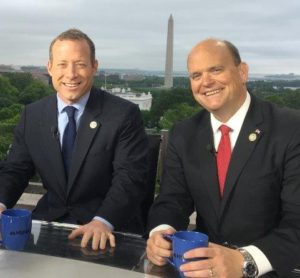
The continuation of failed efforts in Congress to avert the Obamacare health care crisis in America has put a spotlight on its unhealthiest habit: partisan gridlock.
Even with the destabilization of individual markets looming and access to critical health care on the decline, the post Obamacare debate rages on with no credible solutions emerging from either end of the political spectrum. Call it “failed” or just in need of a fix, but one thing most will agree on is that the health care machine that Obamacare aspired to be is unsustainable.
Why isn’t Congress giving our states the flexibility and authority to protect citizens from the rising costs of health care? Where is their freedom to innovate? States still offer the best chance of creating successful health care systems that are tailored to the needs of the communities they understand and serve. By empowering them to function as the lead arbiter, the health care needs of American citizens would be met more directly and efficiently. Who would not agree that outcomes would improve with increased responsiveness and proximity of provider to patient?
Minor improvements will not go far enough. This is no longer a matter of just not being “able to keep our doctors or insurance.” The most expensive health care system in the world just underwent the most expensive overhaul, and it failed to evolve into improvements on outcomes and quality. In response, Republicans similarly tried to repeal and replace with absolutely no Democrat support. From years of Obamacare to the recent Graham-Cassidy amendment briefly floated in the Senate, this purely partisan approach has failed America yet again.
If we are going to begin the battle against the surging costs and complexities of illness and save lives, we are going to need more members of Congress to see compromise as a win.
Acute partisanship won’t end well for America.
Americans deserve a functioning Congress and the best health care system that we can create. But if we are going to begin the battle against the surging costs and complexities of illness and save lives, we are going to need more members of Congress to see compromise as a win.
We must find a way to work together and to work with our states in order to enact policies that are not only diverse, but are also sound and backed by debate, negotiation, and compromise. The best expression of democracy is when our different ideas find common ground in policy that puts the American people, not stakeholders, first.
In July, 43 members of the Problem Solvers Caucus proposed a set of commonsense health care principles that would lower premiums and stabilize the health insurance marketplace for American families and businesses. It reformed the employer mandate and protected states’ authority and flexibility while still being fully paid for. It also extended Cost Sharing Reduction (CSR) payments and created a state dedicated stability fund to help prevent drastic premium increases and lower premium rates.
That was an important first step toward the current process in the Senate.
The current deal recently announced by Senators Lamar Alexander (R-TN) and Patty Murray (D-WA) includes four of the six Problem Solvers’ principles. It is driven by the best bipartisan and bicameral ideas that will eventually replace the Affordable Care Act and improve the health care system for the American people. If we can stabilize the marketplace and lower premiums, we can begin to do the important work of addressing the underlying cost of illness.
If you consider the vast number of options we have to choose from to improve health care, as well as all the chances we have missed to work together, the case for bipartisanship is already made.
Tort reform and drug pricing are also areas in urgent need of attention. Other changes could include introducing (or expanding) rewards for efficiency and quality to Medicare and Medicaid. Similarly, moving away from the traditional fee for service models toward rewarding outcomes and putting a new focus on end-of-life and palliative care will encourage a more holistic approach to wellness.
If you consider the vast number of options we have to choose from to improve health care, as well as all the chances we have missed to work together to implement them for the American people, the case for bipartisanship is already made. Even Senate Minority Leader Chuck Schumer (D-NY) is now embracing the product of months of our hard work in the bipartisan Problem Solvers Caucus.
The bold initiative of Alexander and Murray to work this deal in the Senate only proves that the bipartisan approach to health care solutions is the only way forward. Apparently, the pill may not be the easiest to swallow, but compromise and negotiation are the only way we cure America’s health care.
Tom Reed represents the 23rd District of New York in the U.S. House of Representatives. He serves as Co-Chair of the bipartisan Problem Solvers Caucus.




